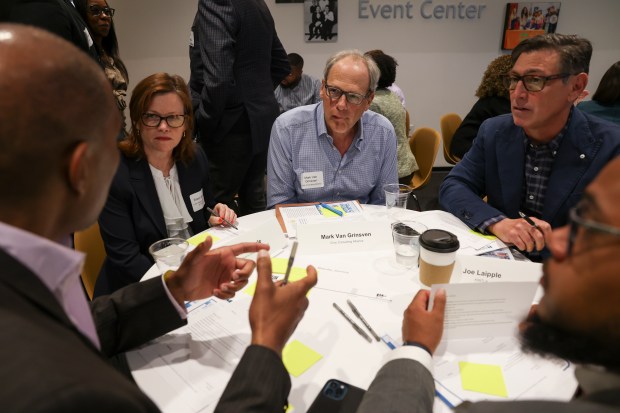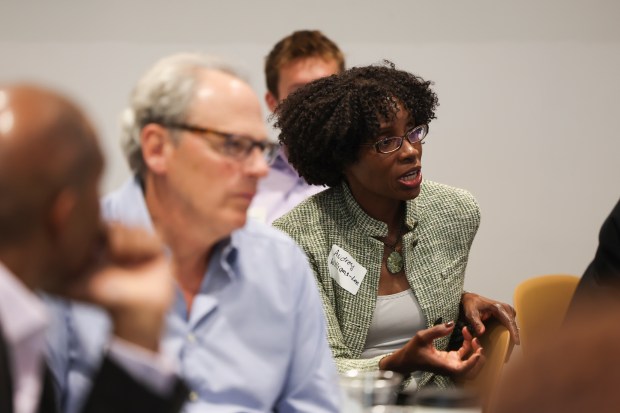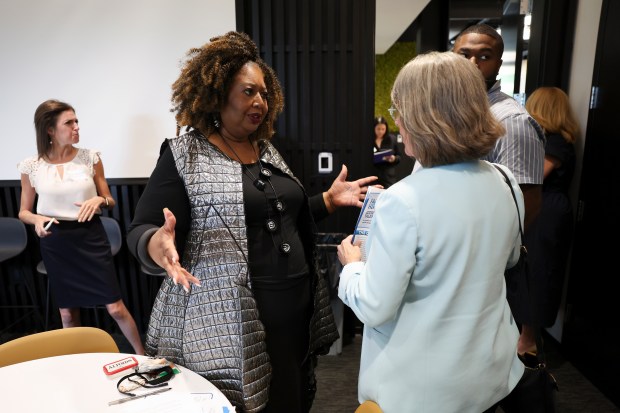A room full of corporate employees and leaders were told to put themselves in the shoes of a formerly incarcerated job-seeker: Imagine being a 29-year-old Chicagoland resident who has served seven years in prison for possession of stolen property and accessory to theft.
You have been diagnosed with post-traumatic stress disorder and attention deficit hyperactivity disorder. You are reliant on public transportation because you don’t have a driver’s license, you live with a cousin, you have been in recovery for substance abuse for 18 months and you attend weekly support group meetings. Although you received job training and participated in reentry programs, you are still working to get your GED.
That was an example of a scenario processed by employers in a mid-June seminar at the North Lawndale Employment Network (NLEN) under the guidance of the Corporate Coalition of Chicago.
The exercise was meant to help businesspeople understand the individuals who are trying to reengage with society, and learn what their hurdles might look and feel like. The activity was hosted by the coalition, an organization comprising dozens of mid- to large-size companies collaborating with local nonprofits.
The five-year-old coalition was created to address economic and racial inequities in neighborhoods across the Chicago area. This endeavor was centered on fair chance hiring, which mandates that employers not rule out someone as a job candidate if they have a criminal record. Efforts such as the one at NLEN showcase the necessity of shifting employer attitudes and practices to expand economic opportunities for people with past convictions.
“The individuals that we serve, you may have heard of the U-Turn Permitted program, is because we discovered in 2002, 57% of the adults in our (North Lawndale) community had some involvement in the criminal justice system,” said Brenda Palms, founder, president and CEO of NLEN. “The biggest barrier to getting a job was the background and the stigma associated with having a background. To be (here) today, talking about fair employment for former justice involvement … it’s a huge step from 2002.”
Palms said employers are now thinking about how candidates deserve fair consideration. “(They’re) opening up doors so those who have had barriers like these can actually walk through and support their families, regain a sense of self-worth and pride in who they are, pay taxes, stop having to look behind their backs because they know they’re doing things that could get them in trouble to support themselves,” she said. “I’m really excited about the conversation.”
According to the Second Chance Business Coalition, roughly 70 million people, or 1 in 3 working-age U.S. adults, have a criminal record. That record can reduce the chances of a second interview by 50%, one reason why nearly 75% of formerly incarcerated people remain unemployed a year after being released.
“When you think about who is disproportionately represented in that 70 million, it’s communities of color,” said Brian Fabes, Corporate Coalition’s managing director. “But it’s just not Black Americans, it’s all Americans. Remember Martha Stewart has a record and people invest in her; golfer Scottie Scheffler has an arrest record. The way we have built up human capital systems in most large corporations and in most of the business world is we have learned how to exclude people, how to screen people out. There’s not this perfect set of people who are waiting for ‘my job.’ This takes work on both sides.”
The coalition is conducting nine-month-long sessions where interested employers gather to get guidance on policy and practice changes to hire, retain and advance people who have been involved with the criminal justice system.
The coalition offers customized one-on-one sessions that allow employers the space to think about best practices, challenges that exist in their practices and what they need to change to integrate fair chance talent into their work pool. Cohort members talk with one another to share action items, work and processes.
The Corporate Coalition will be working with Reform Alliance, a nonprofit restorative justice organization, to promote fair chance hiring in an awareness campaign in the fall. The campaign aims to target medium- and large-size companies in Chicago to encourage them to become fair chance employers.
The coalition is partnering with NORC at the University of Chicago to convene the first national conference around fair chance hiring in October where practitioners, policymakers and researchers will explore the impact of changes in policies and practices.
“What we encourage companies to do is get curious about how are they hiring people. How are they onboarding people? How are they managing people and how are they growing people in their organization?” said Steph Dolan, program director of the fair chance hiring initiative with the Corporate Coalition. “They need to take a look at all of those practices along the spectrum and think about what types of changes must they pursue to be able to tap into this talent pool.
Dolan said the movement needs visible commitment by leaders. “And continuing to pound the drum around the importance of hiring and integrating fair chance talent,” she said. “The companies need to be intentional about how they communicate about this through the organization, how they’re bringing human resources on board, how they’re bringing hiring managers on board, how they’re telling their staff about this decision. And they need to make sure that if they’ve asked staff to bring this to life, they need to give them the talent, the resources, the bandwidth to be able to really do this right.”
Dolan knows that stigma associated with hiring individuals with records persists, but ongoing research and data helps to lessen the fear. She said the Corporate Coalition encourages employers to be more vocal about their work in this because it’s critical in getting other companies on board.
Chasda Martin of NLEN recommends businesses do their due diligence to understand the history of the communities they hire from. That knowledge shows their commitment to support and sustain employment and retention.
“If we really want Chicago to be at the epicenter of this work, we need to make an ecosystem-wide effort — companies who are willing to continue to do the hard work, willing to be advocates and champions about fair chance hiring, partnerships with community-based organizations and philanthropy to continue to prioritize it,” Dolan said.
After the “reentry simulation,” participants talked about how isolating reintegrating into society can be, “checking one’s privilege” and centering the employee experience.

The Corporate Coalition’s cohorts provide invaluable insight for the people who are tasked with helping those individuals achieve a successful reentry. Mandee Polonsky, director of external partnerships at Northwestern Medicine, is a part of the coalition doing the work in her organization. So is Alyssa Berman-Cutler, executive director of community development at the University of Chicago.
“We’re turning our focus and attention to the retention piece,” Polonsky said. “I think a huge part of what we talk about is implicit bias and the work that needs to happen at every level.”
Berman-Cutler said South Side communities are affected much more than other places in Chicago. “As we look at how we could increase our local hiring base, this is one of the things that we knew we had to address, which is why we joined the first cohort for fair chance hiring,” she said. “It helped us define our practices, look deeply into our practices. We really are leaning into transparency. That’s our first step. We have language on all of our job postings now that says we do look at people regardless of background and now we have a really detailed document that says exactly what that means, what you can expect if you’re going through our hiring process.”
Fabes says fair chance hiring is bringing humanity into capitalism. It’s less about business as usual and more “business unusual,” he said.
“What we’re doing is challenging the status quo,” Fabes said. “If the focus is solely on maximizing shareholder return, it doesn’t work.”

Terryon Adams, 23, is a concierge assistant at NLEN. The Roseland native is finding his career path there with the support of the North Lawndale site. He’s looking into computer science, but also possibly getting his truck driving license. Palms said Adams’ trajectory is one of the good things that is happening in Lawndale neighborhood, things taking seed and blossoming.
“It’s about how do we create a culture of belonging because where you feel you belong, you tend to stay,” Palms said. “I think that’s for anybody, no matter what your background. What are we doing to create a culture that promotes and supports belonging?”



